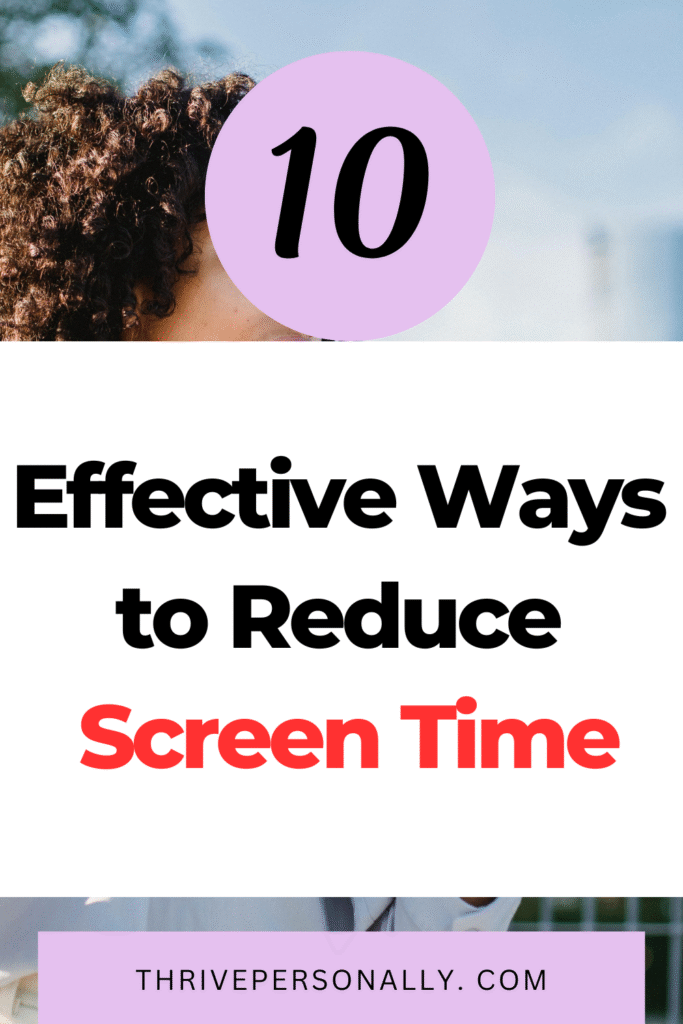I’ve noticed that screens have slowly taken over almost every part of my day—whether I’m working on my laptop, checking my phone, or relaxing in front of the TV. Maybe you’ve felt the same way. At first, it feels normal, but after a while, I realized all that screen time was leaving me tired, distracted, and even a little stressed. It was messing with my sleep and making it harder to stay focused or enjoy real-life moments.
That’s when I decided I needed to make a change. I didn’t want to give up technology completely (let’s be honest, that’s impossible), but I did want to find more balance. And along the way, I discovered some simple but powerful ways to cut down on screen time—without feeling like I’m missing out.
10 Effective Ways to Reduce Screen Time
1. Know How Much Time You Spend on Screens
Before you try to cut down, you need to understand your current screen habits. Most people underestimate how long they’re on their phones or computers.
Start by checking your screen time report if you use a smartphone. Most devices have a feature that shows your daily and weekly usage. Look at which apps or tasks take up most of your time. Is it social media? Video streaming? Games? Messaging?
When you see where your time is going, you’ll know where to start. Awareness is always the first step toward change.
Read also: 25 things to do instead of pressing your phone
2. Set Daily Limits for Certain Apps
Once you know your habits, it’s easier to set some boundaries. If you’re spending too much time scrolling or watching videos, use your phone’s settings to place daily time limits on those apps.
Even setting a one-hour limit per app can make a difference. If you’re on a laptop or desktop, try browser extensions that block distracting websites.
These small limits help you stay in control without giving anything up completely.
Read also: How to Get Rid of Your Phone Addiction – 8 Tips
3. Choose “No Screen” Times Every Day
Pick certain times of day when you won’t use any screens at all. A good example is the first hour after waking up and the last hour before bed. This gives your mind time to slowly wake up or wind down without digital noise.
Other great screen-free times include meals, walks, or when you’re spending time with other people. These breaks help your eyes rest and give your brain a fresh start.
Read also: 17 Focus on Self Improvement Quotes
4. Turn Off Non-Essential Notifications
Every buzz or ding from your phone pulls your attention away from what you were doing. Most notifications aren’t urgent—and they add up fast.
Turn off alerts for things like social media, games, or app updates. Keep calls and texts if needed, but silence the rest.
You can also use “Do Not Disturb” mode during work, study, or rest hours. With fewer distractions, you’ll spend less time on screens and more time focused.
5. Keep Screens Out of the Bedroom
Using your phone in bed may seem harmless, but it hurts your sleep. The blue light from screens keeps your brain awake longer and makes it harder to rest.
Try charging your phone in another room before bed. Use a basic alarm clock to wake up instead.
Your bedroom should be a place to rest, not scroll. With time, your body will relax more easily without that screen glow.
6. Make Screens Less Tempting on Purpose
If using your device becomes a bit less comfortable, you’ll reach for it less often. You can make small changes to help with this.
Switch your screen to grayscale mode to remove bright, engaging colors. Move distracting apps to a hidden folder, or delete them completely if you use them out of habit.
Making it slightly harder to access those apps helps break the automatic urge to check your phone.
7. Replace Screen Time With Real-World Activities
Many people reach for a screen simply because they’re bored or unsure of what else to do. The best way to cut back is to replace that time with something meaningful.
You could read a book, take a walk, write in a journal, draw, or listen to music. These offline hobbies not only keep you busy—they give you calm and real joy.
The more you enjoy those moments, the less you’ll turn to your screen for comfort.
8. Let Tech Help You Use Tech Less
Ironically, some digital tools can help you spend less time on screens. There are apps that block distractions, track usage, or reward you for staying off your device.
Apps like Forest help you stay focused by “growing” a tree when you leave your phone alone. Others like Rescue Time show you how you spend your computer time.
These tools support your goals without needing constant willpower. You don’t have to quit technology—you just need to use it smarter.
You can explore more in this Pew Research Center study on screen habits.
9. Spend More Time With Real People

One of the best ways to cut screen time is by connecting with others face-to-face. Whether it’s family, friends, or neighbors, real-life interactions give you something meaningful screens can’t.
If you’re feeling lonely, bored, or disconnected, a screen may feel like an easy fix—but it’s not the best one. Laughing, talking, and listening in person brings deeper joy than anything you’ll find online.
Too much screen use—especially on social media—can even increase loneliness and anxiety. You can learn more in this NIH study on digital media and mental well-being.
10. Try a Screen-Free Day Now and Then
If you can, take a full day—or even a few hours—completely off screens. Call it a “digital break” or “screen-free Sunday.” Use that time to rest, reflect, or connect with the world around you.
It may feel strange at first, but over time, you’ll start to enjoy these resets. They help your mind, your eyes, and your emotions breathe again.
Even short breaks make a big difference in how you feel.
Final Thoughts
Reducing screen time doesn’t mean tossing your phone or quitting the internet. It’s about making better choices so you feel good, think clearly, and live more fully.
Screens are tools—not the center of your life. You’re in control—not your phone, your TV, or your computer.
When you start setting limits, trying new habits, and reconnecting with the real world, small things begin to change. You’ll sleep better, feel more relaxed, and have more time for what truly matters.
Start small. Pick one idea today. Stick with it. And slowly, you’ll begin to feel more present, balanced, and at peace.
Save the pin for later



